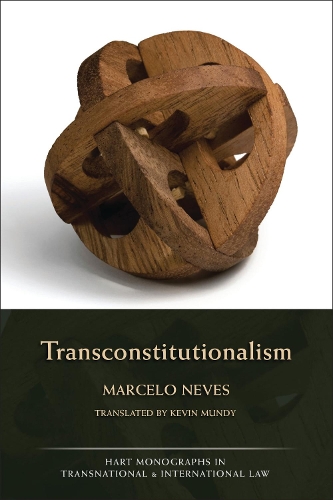
Transconstitutionalism
(Hardback)
Publishing Details
Transconstitutionalism
By (Author) Marcelo Neves
Translated by Kevin Mundy
Bloomsbury Publishing PLC
Hart Publishing
1st May 2013
United Kingdom
Classifications
Professional and Scholarly
Non Fiction
Constitutional and administrative law: general
342
Physical Properties
Hardback
246
Width 156mm, Height 234mm, Spine 22mm
540g
Description
Transconstitutionalism is a concept used to describe what happens to constitutional law when it is emancipated from the state, in which can be found the origins of constitutional law. Transconstitutionalism does not exist because a multitude of new constitutions have appeared, but because other legal orders are now implicated in resolving basic constitutional problems. A transconstitutional problem entails a constitutional issue whose solution may involve national, international, supranational and transnational courts or arbitral tribunals, as well as native local legal institutions. Transconstitutionalism does not take any single legal order or type of order as a starting-point or ultima ratio. It rejects both nation-statism and internationalism, supranationalism, transnationalism and localism as privileged spaces for solving constitutional problems. The transconstitutional model avoids the dilemma of 'monism versus pluralism'. From the standpoint of transconstitutionalism, a plurality of legal orders entails a complementary and conflicting relationship between identity and alterity: constitutional identity is rearticulated on the basis of alterity. Rather than seeking a 'Herculean Constitution', transconstitutionalism tackles the many-headed Hydra of constitutionalism, always looking for the blind spot in one legal system and reflecting it back against the many others found in the world's legal orders.
Reviews
the book combines a thorough (systems) theoretical understanding of constitutional law and world society with a detailed analysis of its implications for concrete cases in this highly complex field. The author deals with a rich pool of theoretical scholarship, including Niklas Luhmann, Gunther Teubner, Hans Kelsen, Martti Koskenniemi, and Anne-Marie Slaughter; but even more importantly for the reader, he also draws on a rich pool of examples of transconstitutional problems. Thus, the book gives a new impulse to the ongoing debate on global constitutional law. It helps practitioners, especially constitutional judges, to comprehend the social conflicts that (invisibly) determine their decisions. For scholars, the book provides an example of the operationalization of system theory to address normative problems in a multicentric world. -- Marie Hesselbarth * International Journal of Constitutional Law, Vol 11, No 4 *
Author Bio
Marcelo Neves is Professor of Public Law and Legal Theory at the University of Brasilia. He has previously taught and studied at the European University Institute in Florence, the Johann Wolfgang Goethe University in Frankfurt, the London School of Economics, and at the universities of Bremen, Fribourg and Flensburg.
